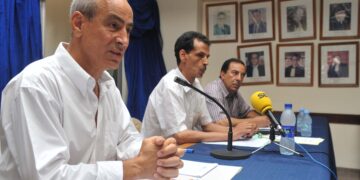Saudi Authorities Use Judicial System and Abusive Counter-Terrorism Law to Further State Repression and Punish Political Expression
(Washington D.C., September 7, 2022) – On August 9, the Appellate Division of Saudi Arabia's Specialized Criminal Court increased the prison sentence of Nourah bint Saeed al-Qahtani from 13 years to 45 years after the lower court had convicted her of Twitter-based crimes including "using the Internet to tear the [country's] social fabric" and "violating the public order by using social media" under the Counter-Terrorism Law and Anti-Cyber Crime Law, according to a new court document received by Democracy for the Arab World Now (DAWN) and verified by Saudi sources.
"Emboldening the judiciary to impose outrageously long, draconian sentences for peaceful political expression is the newest tactic in Crown Prince Mohammed bin Salman's quest for total control in Saudi Arabia," said Abdullah Alaoudh, Director for the Gulf Region at DAWN. "It is incomprehensible for a country governed by even a semblance of the rule of law to allow a court to arbitrarily increase a prison sentence for tweeting from 13 to 45 years."
DAWN first reported al-Qahtani's sentence on August 30 and since then has received additional information regarding her case. On September 6, DAWN learned that Saudi authorities arrested al-Qahtani on July 4, 2021. The Specialized Criminal Court initially convicted her on February 16, 2022 of several charges under the Counter-Terrorism Law and the Anti-Cyber Crime Law, such as "breaking the social fabric in the Kingdom" by criticizing Saudi rulers, and "producing, and storing materials impinging on public order and religious values." Al-Qahtani's Twitter account @Najma097 is critical of the government, but calls only for peaceful protests. It has less than 600 followers.
"This ruling makes clear that no one in Saudi Arabia that dares to criticize the government or question MBS is safe from the government's omnipresent surveillance or its repressive tactics," said Alaoudh. "As MBS' power grows, so too does the Saudi government's authoritarian reach and its willingness to punish any opponent, no matter how large or small their public profile or how basic their message."
The Specialized Criminal Court initially sentenced al-Qahtani to 13 years in prison, but then suspended six and a half years of her sentence. On August 9, 2022, the Appellate Court confirmed the lower court's decision, but increased the sentence to 45 years without providing explanation. DAWN also learned that Nourah al-Qahtani is from Saudi Arabia's Eastern Province. She is 49 years old and has five children, including a ten-year old daughter with a genetic disease that will require care and supervision throughout her life. Al-Qahtani suffers from diabetes and other medical issues, but the conditions of her imprisonment, including whether she is receiving adequate medical care, are not known at this time.
"The purpose of these sentences is crystal clear: to terrorize Saudi Arabians into silence with the knowledge that even the mildest political expression can lead to a lifetime in prison," said Alaoudh. "While some commentators have been falling over themselves to describe MBS as a reformer, his iron fisted tactics and complete intolerance of any dissent tells the true story."
Al-Qahtani's ruling occurred the same day that Saudi authorities sentenced Salma al-Shehab, a University of Leeds doctoral student and mother of two children, to 34 years in prison. In that case, the Specialized Criminal Court convicted al-Shehab of having a Twitter account and for retweeting and following Saudi dissidents and human rights activists. Similar to al-Qahtani's case, the Appellate Division then increased the lower court's eight-year sentence to 34 years, with no explanation to justify the 34 years other than a declaration that the original sentence did not achieve sufficient "restraint and deterrence."
Saudi Arabia's Specialized Criminal Court has jurisdiction over terrorism and security-related cases through an overly broad and vague Counter-Terrorism Law. Human rights organizations and UN bodies have repeatedly criticized the Counterterrorism Law and the Anti-Cyber Crime Law for allowing the government to repress Saudi citizens and undermine human rights.







































